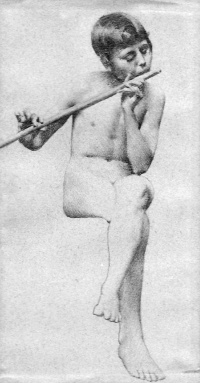Boy (dictionary): Difference between revisions
| (5 intermediate revisions by the same user not shown) | |||
| Line 1: | Line 1: | ||
{{Info box/dictionary|name=Boy | {{Info box/dictionary|name=Boy | ||
|pos= ''n'' (boi) | |pos= ''n'' (boi) | ||
| Line 6: | Line 7: | ||
}} | }} | ||
[[File:UHL Joseph - Flötender Knabe 641x1228.jpg|thumb|200 px|Fluteboy / Joseph Uhl. – Drawing.]] | |||
A '''boy''' is a male human child. Determining which specific individuals fall into the category of "boy," however, is not as simple as it may seem. For example, in many countries one is legally still considered a boy until reaching the legislated [[age of majority]] (for example, 18 years of age in the [[United States of America|United States]]). On the other hand, to many individuals, one is no longer a child once one has completed [[puberty]], which often happens at a much lower age than 18. Also, many countries (for example, Spain) have an [[age of consent]] which is different than the age of majority or other significant ages (legal drinking age, legal working age, etc.) which puts many people in the awkward position of being considered a child for some purposes and an adult for others. | A '''boy''' is a male human child. Determining which specific individuals fall into the category of "boy," however, is not as simple as it may seem. For example, in many countries one is legally still considered a boy until reaching the legislated [[age of majority]] (for example, 18 years of age in the [[United States of America|United States]]). On the other hand, to many individuals, one is no longer a child once one has completed [[puberty]], which often happens at a much lower age than 18. Also, many countries (for example, Spain) have an [[age of consent]] which is different than the age of majority or other significant ages (legal drinking age, legal working age, etc.) which puts many people in the awkward position of being considered a child for some purposes and an adult for others. | ||
| Line 15: | Line 16: | ||
The origin of the English word ''boy'' is unclear; it is probably related to East Frisian ''boi'', Old Norse ''bófi'', Dutch ''boef'' ("knave", "rogue"), and German ''Bube''. These apparently all have their origin in baby talk (like the word ''baby'' itself). | The origin of the English word ''boy'' is unclear; it is probably related to East Frisian ''boi'', Old Norse ''bófi'', Dutch ''boef'' ("knave", "rogue"), and German ''Bube''. These apparently all have their origin in baby talk (like the word ''baby'' itself). | ||
{{clr}} | |||
==See also== | |||
* [[The Boy (disambiguation)]] | |||
*[[Sexuality]] '''-''' [[Adrenarche]] {{puce}} [[Gonadarche]] {{puce}} [[Peripubescence]] | |||
* [[:Category:Boys]] | |||
*[[Young friend]] {{puce}} [[Loved boy]] {{puce}} [[Beloved]] {{puce}} [[Eromenos]] {{puce}} [[Paidika (dictionary)|Paidika]] {{puce}} [[Catamite]] {{puce}} [[Puer delicatus]] | |||
*[[Boy (relationship)]] | |||
[[Category:Dictionary]] | [[Category:Dictionary]] | ||
Latest revision as of 13:43, 10 December 2015
| BoyWiki Dictionary: Boy |
| n (boi) |
|
¹ a male child |
|
² a young man |
|
³ a male child; lad; youth |

A boy is a male human child. Determining which specific individuals fall into the category of "boy," however, is not as simple as it may seem. For example, in many countries one is legally still considered a boy until reaching the legislated age of majority (for example, 18 years of age in the United States). On the other hand, to many individuals, one is no longer a child once one has completed puberty, which often happens at a much lower age than 18. Also, many countries (for example, Spain) have an age of consent which is different than the age of majority or other significant ages (legal drinking age, legal working age, etc.) which puts many people in the awkward position of being considered a child for some purposes and an adult for others.
The problem is not that there is a lack of clarity regarding who is or is not a boy, but rather that the status itself is fluid and different people make the transition to adulthood at different times. For some boylovers, for example, a young-looking sixteen-year-old still appeals to them as a boy whereas an old-looking fourteen-year-old may not. Thus, when describing someone as a "boy," we must understand that, while there are vast areas of agreement, there is still a small hazier area in the middle where disagreement should be expected.
Etymology
The origin of the English word boy is unclear; it is probably related to East Frisian boi, Old Norse bófi, Dutch boef ("knave", "rogue"), and German Bube. These apparently all have their origin in baby talk (like the word baby itself).